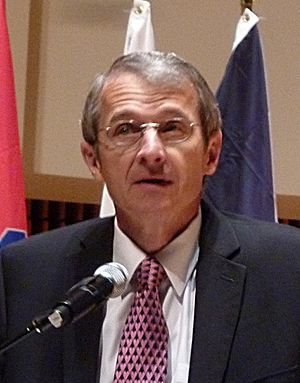Richard R. Schrock facts for kids
Quick facts for kids
Richard R. Schrock
|
|
|---|---|

Richard Schrock during the Opening Ceremony of 44th International Chemistry Olympiad (2012)
|
|
| Born |
Richard Royce Schrock
January 4, 1945 |
| Nationality | American |
| Alma mater | |
| Known for |
|
| Spouse(s) |
Nancy Carlson
(m. 1971) |
| Children | 2 |
| Awards |
|
| Scientific career | |
| Fields | Chemistry |
| Institutions | |
| Thesis | Synthesis and study of some Group VIII transition metal catalysts (1972) |
| Doctoral advisor | John A. Osborn (fr) |
| Other academic advisors | Jack Lewis (post doctoral) |
| Doctoral students |
|
| Other notable students | Post-docs: |
Richard Royce Schrock, born on January 4, 1945, is an American chemist. He won a Nobel Prize for his important work on a special chemical reaction called olefin metathesis. This reaction is very useful in organic chemistry, which is the study of carbon-based chemicals.
Contents
Richard Schrock's Early Life and Schooling
Richard Schrock was born in Berne, Indiana. He grew up and went to high school in San Diego, California. He earned his first degree, a Bachelor of Arts (B.A.), in 1967 from the University of California, Riverside. Later, he received his Ph.D. (a higher degree) in 1971 from Harvard University. His advisor for his Ph.D. was Professor John A. Osborn.
Richard Schrock's Career Journey
After finishing his Ph.D., Dr. Schrock did more research at the University of Cambridge in England. In 1972, he started working at DuPont, a large science company, in Wilmington, Delaware.
Working at MIT
In 1975, he joined the MIT as a professor. By 1980, he became a full professor. Since 1989, he has been the Frederick G. Keyes Professor of Chemistry at MIT. He is now a Professor Emeritus, which means he is retired but still connected to the university.
Dr. Schrock is also a member of important science groups. These include the American Academy of Arts and Sciences and the National Academy of Sciences. In 2007, he was chosen to be on the Board of Overseers for Harvard University.
Starting a Company
He helped start a company called XiMo, inc., which is based in Switzerland. This company works on creating and using special catalysts for metathesis reactions. Verbio, AG now owns XiMo, inc.
Returning to His Alma Mater
In 2018, Dr. Schrock went back to his old university, the University of California, Riverside. He is now a Distinguished Professor there. He wanted to help and guide younger professors and students. He said that his time as a student at UCR helped him prepare for his studies at Harvard. He was happy to return and give back to the university.
Richard Schrock's Important Research
Dr. Schrock's research has greatly helped the field of chemistry.
Discovering New Reactions
In 1974, he found a new type of chemical reaction. This reaction helps create special chemical compounds called alkylidene and alkylidyne complexes.
At MIT, Dr. Schrock was the first to explain how certain "black box" catalysts work in olefin metathesis. He showed that his new reaction could be used to make many different molybdenum or tungsten alkylidene and alkylidyne complexes. This meant that chemists could design catalysts for specific purposes.
Understanding Metathesis
Dr. Schrock's work showed that certain ring-shaped molecules, called metallacyclobutanes, are key parts of the olefin metathesis reaction. He also studied how to make ammonia from nitrogen gas, similar to how nature does it. This involves creating special catalysts that act like enzymes found in living things.
Developing New Catalysts
He explored many different supporting chemicals to better understand these catalysts. The type of catalyst he is famous for is called a "Schrock catalyst." These catalysts are now sold by major suppliers and are used often in labs and in industry.
Dr. Schrock continues his research today. He aims to understand metathesis reactions even better. He also works on creating new types of catalysts and learning how certain chemical compounds are formed naturally.
Awards and Honors for Richard Schrock
Nobel Prize in Chemistry
In 2005, Richard Schrock received the Nobel Prize in Chemistry. He shared this award with Robert H. Grubbs and Yves Chauvin. They were honored for their groundbreaking work on olefin metathesis, a very important technique in organic synthesis.
Other Awards and Recognitions
Besides the Nobel Prize, Dr. Schrock has received many other awards:
- ACS Award in Organometallic Chemistry (1985)
- Harrison Howe Award (1990)
- Alexander von Humboldt Award (1995)
- ACS Award in Inorganic Chemistry (1996)
- Bailar Medal (1998)
- ACS Cope Scholar Award (2001)
- Sir Geoffrey Wilkinson Lecturer and Medalist (2002)
- Sir Edward Frankland Prize Lecturer (2004)
- F. Albert Cotton Award in Synthetic Inorganic Chemistry (2006)
- Theodore Richards Medal (2006)
- August Wilhelm von Hofmann Medal (2005)
- Basolo Medal (2007)
- He was elected a Foreign Member of the Royal Society in 2008.
- In 2013, the chemistry library at the University of Sussex was named in his honor.
- A type of chemical compound, called Schrock carbenes, is named after him.
Richard Schrock's Family Life
Richard Schrock married Nancy Carlson in 1971. They have two children, Andrew and Eric. Nancy Schrock worked at the MIT Libraries for several years. The family lives in Winchester, Massachusetts.
See also
 In Spanish: Richard Schrock para niños
In Spanish: Richard Schrock para niños

